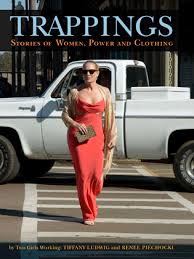trappings
英 [ˈtræp.ɪŋz]
美 [ˈtræp.ɪŋz]
- n. 服饰,礼服;外部标志;马饰
使用频率:

记忆方法
1. drap- => trap- + 双写p加-ing + -s (复数后缀).
2. Trappings are etymologically "drapery".
3. => ornamental covering for a horse, cloth for a horse.
2. Trappings are etymologically "drapery".
3. => ornamental covering for a horse, cloth for a horse.
中文词源
trappings 标志,服装
来自中古英语 trappe,马鞍,马饰,装饰,改写自法语 drap,布,词源同 drape,窗帘,帘布。后 引申词义个人所有物,标志,服装等。
英语词源
- trappings
-
trappings: [14] Trappings are etymologically ‘drapery’. The word was adapted from Anglo- Norman *trapour, a variant of Old French drapure; and this in turn was a derivative of drap ‘cloth’, source of English drape, drapery, etc. It was originally used in English for an ‘ornamental covering for a horse’, and its more general modern meaning did not emerge until the 16th century.
=> drape, drapery - trappings (n.)
- late 14c., "horse-cloth," from Middle English trappe "ornamental cloth for a horse" (c. 1300), later "personal effects" (mid-15c.), alteration of Middle French drap "cloth" (see drape (n.)).
权威例句
- 1. They enjoyed all the trappings of wealth.
- 他们享有所有象征财富的东西。
- 2. A horse is neither better nor worse for his trappings.
- 不能根据马饰论马的优劣.
- 3. The judge wore a wig and all the trappings of his position.
- 法官戴了假发和全套代表他那个地位的服饰.
- 4. She scorns the visible trappings of success, preferring to live unnoticed.
- 她鄙视标志成功的外在之物, 更愿意默默无闻地生活.
- 5. She was arrayed with splendid trappings.
- 她穿着华丽的礼服.
